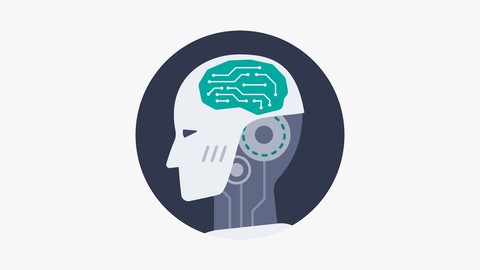
Machine Learning (ML) Bootcamp: Python, TensorFlow, Colab,..
Machine Learning (ML) Bootcamp: Python, TensorFlow, Colab,.., available at $44.99, has an average rating of 4.25, with 48 lectures, 9 quizzes, based on 35 reviews, and has 6913 subscribers.
You will learn about The three building blocks of Machine Learning: Maths, Methods and Machine. Maths: Calculus, Linear Algebra, Statistics, Naive Bayes Methods: Neural Networks, Deep Learning, PCA, Scikit-learn, Tensorflow, Keras Machine: Python, Cloud Computing, Colab Insights into real life projects and how to apply the concepts This course is ideal for individuals who are Everyone who is interested in machine learning and artificial intelligence. or Pupils, students, employees in all kind of roles, self-employed workers or You! It is particularly useful for Everyone who is interested in machine learning and artificial intelligence. or Pupils, students, employees in all kind of roles, self-employed workers or You!.
Enroll now: Machine Learning (ML) Bootcamp: Python, TensorFlow, Colab,..
Summary
Title: Machine Learning (ML) Bootcamp: Python, TensorFlow, Colab,..
Price: $44.99
Average Rating: 4.25
Number of Lectures: 48
Number of Quizzes: 9
Number of Published Lectures: 48
Number of Published Quizzes: 9
Number of Curriculum Items: 73
Number of Published Curriculum Objects: 73
Original Price: $84.99
Quality Status: approved
Status: Live
What You Will Learn
- The three building blocks of Machine Learning: Maths, Methods and Machine.
- Maths: Calculus, Linear Algebra, Statistics, Naive Bayes
- Methods: Neural Networks, Deep Learning, PCA, Scikit-learn, Tensorflow, Keras
- Machine: Python, Cloud Computing, Colab
- Insights into real life projects and how to apply the concepts
Who Should Attend
- Everyone who is interested in machine learning and artificial intelligence.
- Pupils, students, employees in all kind of roles, self-employed workers
- You!
Target Audiences
- Everyone who is interested in machine learning and artificial intelligence.
- Pupils, students, employees in all kind of roles, self-employed workers
- You!
Do you want to master Machine Learning (ML) – the key field of the future?
ML is the core of artificial intelligence and will transform all industries and all areas of life.
This comprehensive course covers the three M’s Maths, Methods and Machine, and is easy to understand.
Maths
-
Calculus
-
Linear Algebra
-
Probability theory
-
Statistics
Methods
-
Machine learning libraries
-
Scikit-learn
-
Tensorflow
-
Keras
-
-
Estimators & Predictors
-
Neural Network (Deep Learning)
-
Support Vector Machine
-
K-Nearest Neighbor
-
Decision Tree
-
and many more
-
-
Concepts & techniques
-
Principal Component Analysis (PCA)
-
Neural Machine Translation (NMT)
-
Long Short-Term Memory (LSTM)
-
Monte-Carlo Tree Search (MCTS)
-
Deep Convolutional Generative Adversarial Network (DCGAN)
-
and many more
-
Machine
-
Python
-
Cloud Computing
-
Colab Cloud Notebook
These three building blocks will give you the deep understanding of the subject.
Machine Learning
-
Supervised learning
-
Regression
-
Classification
-
-
Unsupervised learning
-
Reinforcement learning
Furthermore projectswill provide insights into real life solutions.
Projects
-
Titanic dataset (binary classification)
-
Boston Housing dataset (regression)
-
Student performance (binary classification)
-
Hand-written digits (image recognition & generation)
-
Stock market predictions
-
Text recognition and language translation
-
Autonomous driving (reinforcement learning)
-
Mastering the game of GO (deep reinforcement learning)
-
Segmentation of customer data (PCA)
-
Spam detection (Bayes)
Do not hesitate and join the course. ML will transform your life!
This course is extraordinary, as it is easy to understand, and combines education with entertainment.
Learning should be exciting!
Enjoy the course and all the best for your future!
Machine Learning is the key component of artificial intelligence and will transform our lives and all industries.
Stay ahead of the game!
Course Curriculum
Chapter 1: Introduction & Overview
Lecture 1: Introduction
Lecture 2: ML in a Nutshell
Lecture 3: Linear Regression
Chapter 2: Methods 0: Scikit-learn
Lecture 1: Overview
Lecture 2: Data transformation and splitting
Lecture 3: Estimators
Lecture 4: Metrics
Lecture 5: Example: IRIS data set
Chapter 3: Project: Titanic (Binary Classification)
Lecture 1: Titanic Dataset
Lecture 2: Data exploration
Lecture 3: Data transformation and ML model
Chapter 4: Project: Boston Housing (Regression)
Lecture 1: Boston Housing solution
Chapter 5: Project: Student Performance (Binary Classification)
Lecture 1: Student Performance solution
Chapter 6: Methods 1: Neural Networks
Lecture 1: Concepts
Lecture 2: Forwardpropagation
Lecture 3: Backpropagation
Lecture 4: Activation Functions
Lecture 5: Loss Functions
Chapter 7: Methods 2: Tensorflow
Lecture 1: Overview
Lecture 2: Implementing a neural network
Lecture 3: Example: MNIST Fashion
Chapter 8: Project: MNIST hand-written digits (DCGAN)
Lecture 1: Introduction to GAN, CNN and DCGAN
Lecture 2: DCGAN MINST solution
Chapter 9: Project: Stock market prediction (LSTM)
Lecture 1: Introduction to time series data, RNN and LSTM
Lecture 2: LSTM solution
Chapter 10: Project: Language Translation (NMT)
Lecture 1: Introduction to Sequence-to-sequence (seq2seq) models
Lecture 2: NMT solution
Chapter 11: Reinforcement Learning
Lecture 1: Overview
Lecture 2: Autonomous driving
Lecture 3: Master the game of Go
Lecture 4: Whitepaper AlphaGo Zero
Chapter 12: Maths 1: Calculus
Lecture 1: Introduction Calculus
Lecture 2: Limits
Lecture 3: Derivatives
Lecture 4: Extrema
Lecture 5: Integrals
Chapter 13: Maths 2: Linear Algebra
Lecture 1: Introduction Linear Algebra
Lecture 2: Vector and matrix operations
Lecture 3: Matrix Multiplication
Lecture 4: Matrix inverse
Lecture 5: Eigenvalues and eigenvector
Chapter 14: Project: Customer segmentation (PCA)
Lecture 1: Introduction to PCA (Principal Component Analysis)
Lecture 2: Customer segmentation solution
Chapter 15: Project: Spam detection (Bayes)
Lecture 1: Introduction to Bayes
Lecture 2: Spam detection solution
Chapter 16: Sources and further reading
Lecture 1: Abbreviations
Lecture 2: Sources, links and further reading
Lecture 3: Crossword Puzzle Solver – Implementation Concept
Instructors
-
Samuel Reischl
Diplom Mathematiker
Rating Distribution
- 1 stars: 5 votes
- 2 stars: 3 votes
- 3 stars: 8 votes
- 4 stars: 11 votes
- 5 stars: 8 votes
Frequently Asked Questions
How long do I have access to the course materials?
You can view and review the lecture materials indefinitely, like an on-demand channel.
Can I take my courses with me wherever I go?
Definitely! If you have an internet connection, courses on Udemy are available on any device at any time. If you don’t have an internet connection, some instructors also let their students download course lectures. That’s up to the instructor though, so make sure you get on their good side!
You may also like
- Top 10 Content Creation Courses to Learn in December 2024
- Top 10 Game Development Courses to Learn in December 2024
- Top 10 Software Testing Courses to Learn in December 2024
- Top 10 Big Data Courses to Learn in December 2024
- Top 10 Internet Of Things Courses to Learn in December 2024
- Top 10 Quantum Computing Courses to Learn in December 2024
- Top 10 Cloud Computing Courses to Learn in December 2024
- Top 10 3d Modeling Courses to Learn in December 2024
- Top 10 Mobile App Development Courses to Learn in December 2024
- Top 10 Graphic Design Courses to Learn in December 2024
- Top 10 Videography Courses to Learn in December 2024
- Top 10 Photography Courses to Learn in December 2024
- Top 10 Language Learning Courses to Learn in December 2024
- Top 10 Product Management Courses to Learn in December 2024
- Top 10 Investing Courses to Learn in December 2024
- Top 10 Personal Finance Courses to Learn in December 2024
- Top 10 Health And Wellness Courses to Learn in December 2024
- Top 10 Chatgpt And Ai Tools Courses to Learn in December 2024
- Top 10 Virtual Reality Courses to Learn in December 2024
- Top 10 Augmented Reality Courses to Learn in December 2024






















